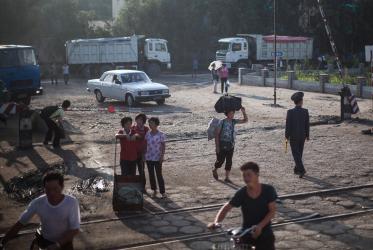October 19
We come from the World Council of Churches, and our delegation is representing 4 continents of the world – from east to the west, from north to the south.
We bring you greetings from the different parts from which we have come, but also from the WCC in Geneva.
I wanted to bring you greetings especially from the Christians that I have met during the last weeks as I was travelling to Greece and then in my own country, Kenya, in Africa.
Usually when I travel and have a chance to share the word of God, I start by bringing such greetings from the staff of the WCC in Geneva but also from Christians in Kenya where I was preaching in Nairobi last Sunday.
And I usually like to greet people in my own language which is Swahili. I can teach you at least how to say “greetings”: Jambo.
And when I say to you, “jambo”, you say “jambo bana”. It is very, very easy.
Now you speak some Swahili, and I am very pleased with that.
Let us pray, in the name of the Father, the Son, the Holy Spirit.
The text on which we based our message this morning is from 1 Corinthians, chapter 12.
In the passage, St. Paul is writing from Ephesus to the Christians in the new church in Corinth.
The new church that had been formed in Corinth was going through difficulties.
There were problems of divisions within the church; some people were opposing others.
And since Paul was very concerned with that division, he uses a powerful image to try to help the Christians in the church in Corinth to overcome their divisions.
He uses the image of the church as one body.
The church is one body of Christ.
Paul says the body has many parts, and it is one body, and it must remain as one, united.
Paul says that each part of the body is very important.
And the body is whole when all the parts cooperate with each other.
And therefore in his letter to the churches in Corinth, Paul appeals to the community to recognize one another as being a very important part of the body.
For the body to function well, all the interdependent parts must cooperate together.
No matter what part you are, you are important.
Whether it is the eyes or the ear or the arm or the leg, one cannot do without the others because we all perform different functions.
And therefore Paul tried to have everyone accept each other, because without the other we are incomplete.
There are two main learnings I want us to reflect on this morning.
The first is that we are called to take care of each other.
The second is to recognize the need for nurturing the unity which is given to us by Jesus Christ.
This image of the body is applicable to the church and is also applicable to the human community.
And as human community, whether we are talking of one country or many countries, one place or many places, we are dependent on each other and we need each other.
It is in this recognition of the need to care for each other in the world that we become a transcendent world community concerned about the needs of each other.
Very often, it is when there is a tragedy in the world that we come together to try and help those who are affected by such a tragedy.
And in the WCC we have tried to respond to the needs of the people, whether affected by natural calamity or by human actions.
Whether we are talking of an earthquake in Indonesia, of floods in the Philippines, or a tsunami in the Pacific - the kind of natural calamities that have occurred in the last few weeks - we know that the human community has tried to come to the help of those who are in need.
Because if we are one body, when any part of the body is in pain, the whole body is in pain.
When one part suffers, the whole body suffers.
And the same things should be realized concerning the human community: when one part suffers, we should feel the pain of those who are experiencing that suffering.
As the ecumenical fellowship at the World Council of Churches, how should be feel if any one part of the fellowship suffers? We should feel that pain.
And there is no part that should feel it more nor less directly than the other.
No part should feel that it is so independent that they do not need the other.
We need each other.
Even in the human community, we need each other.
That is why it is important for those who are in a position to help others to go out to help the others.
And there is no part that should feel it is more important than the other, and that is why for us the membership of the Korean Christian Federation is so greatly valued. Our visit to you at this time gives me a chance to speak the message that we believe the KCF is very much a part of the fellowship of the WCC.
And that we need to work with you in order to be able care for the welfare of your people, to care for the spiritual welfare of everybody, and to know that we can have that unity of the Spirit.
To care for the social welfare, for your people and your community, to know that we are a good witness to Jesus Christ: this is what it means to be Christian within a society.
And also to be concerned about the material and economic welfare of people so that we can offer the service that Jesus Christ calls us to provide.
Therefore we come here to learn from you, to listen to you in order to know how we best can share the message of what it means to be Christians here, and how the rest of the world can support you in your ministry.
When it comes to the second point, we can learn how to care for the unity that we seek as the body of Christ.
Koreans know the pain of being separated.
For more than 50 years there has been a separation among the Korean people. And this separation was caused by people other than the Koreans themselves.
For many years there are those families who have been longing to be reunited, each on a different side of the peninsula.
We have watched just recently when there was an opportunity for families from North Korea and South Korea to see one another. It was a very emotional reunion.
The very real possibility of the reunification of Korea is something the World Council of Churches is yearning for, and we fervently support. Because when people come together you see how they hug each other, how they rejoice together. Jesus Christ himself rejoices to see this happen.
That is why we continue as the WCC to work with the KCF and the churches in South Korea, to support reconciliation and peace and hope.
And we know that the desire of all Korean people is to overcome this division.
But there are forces that we know are not open and supportive of such a reunion and its implications.
And they need to hear the message that comes from the Korean people. The desire and cry for reunification.
We pray that God will give us the power necessary to facilitate the process toward the reunification of the Korean peninsula.
As churches and as governments all over the world, we should be working together so that this can be realized as soon as possible.
We wanted to say that when we come to be with you here, we are prepared to be your messengers. We are prepared to be your ambassadors of peace and healing and of reunification.
So we come with open ears and eyes in order to hear and see.
During these four days here we will listen to you and your leaders. We have begun to hear what you want the world church to do together with you.
And we hope therefore to work towards the goal: The time will come when reunification, and the joy and peace and healing that it brings, will be the experience of all the Korean people.
Therefore we listen to what Paul has set out in this teaching this morning, that we are one body, with different parts but interdependent. We need each other. You can count us as your friends and as your brothers and sisters. And we shall continue to work tirelessly so that your dreams and aspirations will be fulfilled through God's grace.
And we continue to pray to God: there are many Koreans in the north and south, and although some are advanced in age now, may they one day see this dream come true!
And that is the message that we bring to you today. We praise God that we have been able to be in fellowship with you this morning. Praise God!
Thank you, and may God bless you, bless your families and bless this country.
Thank you, and Amen.


